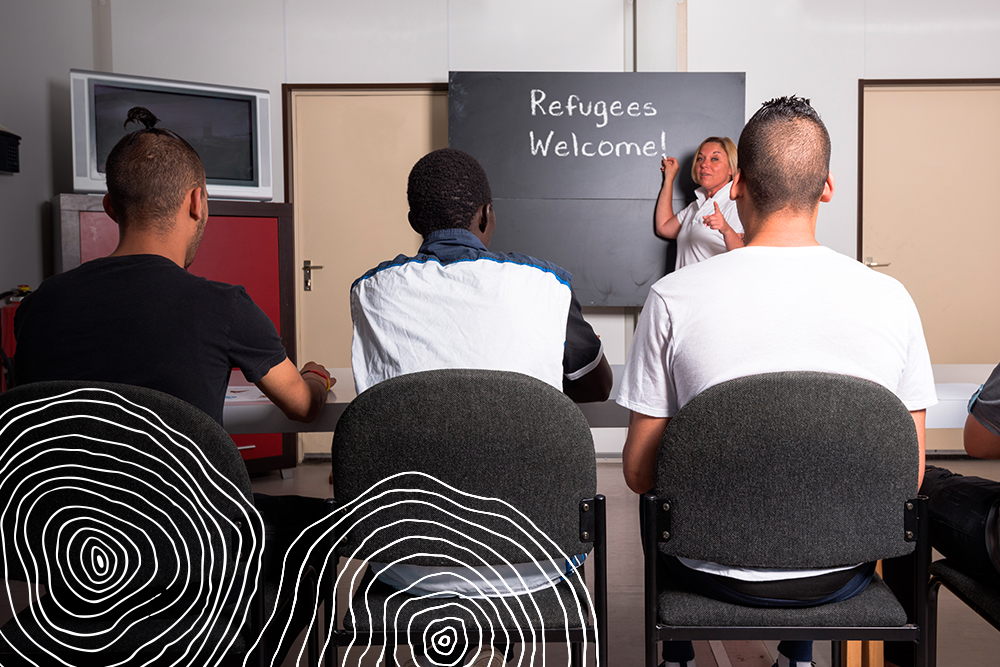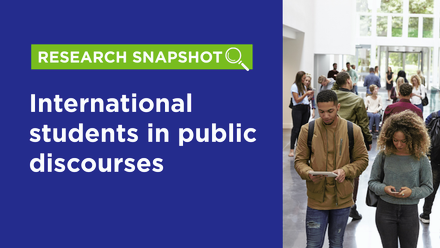Inclusion via education: integrating refugees in German society

For a year spanning 2015–2016, Europe experienced sudden and massive arrivals of migrants and refugees, quickly dubbed a ‘crisis’ by the media. As of 2019, host countries in Europe are still dealing with the aftermath. But Germany has quickly risen to the fore for its initial welcome and the innovative approaches it has taken to accommodating the arrival of newcomers four years ago. Based on interviews conducted in the summer of 2019 as part of an intensive two-week study tour that explored the integration of refugees into German higher education, this blog post will briefly discuss Germany’s approach to integration through higher education and how this has made for a German higher education landscape that is more inclusive of refugees.
Taking German Chancellor Angela Merkel’s simple declarative statement in 2015, "Wir Schaffen das" (‘we will manage it’) at face value, one could argue that Germany’s open-door policy towards refugees in 2015–2016 was motivated by a humanitarian rationale. German Commissioner for Immigration, Refugees and Integration Aydan Ozoguz also expressed this humanitarian sentiment at the time when she said, "there was no ‘decision’ to take in one million refugees. Instead, we decided not to close the German borders during a humanitarian emergency."
Programmes for refugee participation
Germany is facing the challenge of integrating new refugees at the same time as it navigates issues associated with demographic shifts and an aging workforce. If demographic trends continue unchanged, by 2030 the country will be short 3 million skilled workers. While some bemoaned this reality in 2015, others were quick to see an opportunity. More than half of the refugees who arrived in Germany between 2015 and 2016 were under age 25, in need of or eligible for primary, secondary or tertiary education.
With sufficient support and investment, these refugees were seen as eventually becoming part of the German workforce, ready to fill the jobs the country needed most. The German Federal Ministry of Education and Research (BMBF) saw this potential in 2016 when it made €100m available through the German Academic Exchange Service (DAAD) for the development of two new programmes that would directly support refugee access to university study: ‘Integra’ and ‘Welcome’.
Driven by local students, Welcome projects consist of hosting cultural events and offering informal language exchanges, while the Integra programme provides language and subject-specific courses, as well as organised ‘buddy programmes’ that pair local university students with international students as mentor and mentee.
Learning the language
Multiple conversations over the course of the study tour brought three criteria for refugee integration to the fore: language ability, housing, and employment/education. These criteria build upon one another: language ability can lead to education and employment opportunities, and with a secure source of funding, refugees can better integrate into the housing market. Those unfamiliar with Germany might be surprised to learn that Germany requires advanced certifications for nearly every position on the job market. While the U.S. and many other countries have a culture of on-the-job learning – which can facilitate learning the local language – these stiffer requirements in Germany present a barrier to refugees who might otherwise concurrently learn a trade and the language on the job.
Entering higher education causes an identity shift from ‘refugee’ to ‘student,’ which has critical emotional and psychological effects
German language education is therefore vital, and the German government, universities and civil society have done an admirable job of making instruction available to asylum recipients. The government provides German courses free of charge to individuals who are granted asylum. Civil society organisations often fill the gap before asylum is granted, opening courses for local residents in temporary housing. While the government’s classes bring their participants to an intermediate level in German, universities require a higher score of C1, according to the Common European Framework of Reference for Languages. To that end, many universities opened their language preparation courses to students and potential students of refugee background for free, enabling these students to attain the high level of German that is required to enter its universities.
Command of German enables refugees to make the transition to student. Armed with academic or technical degrees and certifications, graduates are able to enter the job market in the same position as any German with the same degree and qualifications. Economically, the impact of refugees securing employment is significant, not only for the individual, their family and community, but also for Germany broadly. Employment also engenders more buy-in between the employer and worker, as well as greater autonomy to manage issues related to living conditions, family relations, and housing, adding another critical element to integration. But there are also other dimensions to this empowerment.
Shifting sense of identity
Entering higher education causes an identity shift from ‘refugee’ to ‘student,’ which has critical emotional and psychological effects. It also exposes students with refugee backgrounds to Germans and international students, enabling the development of more bonds and relationships that can provide support and a sense of community to someone who has been uprooted from everything they once knew. Interacting and forming relationships with Germans also impacts a student’s drive and ability to integrate and feel secure and comfortable in their new environment.
While many of the hosts with whom we met suggested that incorporating the voices of students of refugee background into university decision-making and administration would be beneficial to their hosting institutions, empirical data is still missing that concretely documents how and if this is occurring. With tens of thousands of students of refugee background now officially enrolled in universities throughout the country, researchers and administrators are keenly interested in analysing data on the outcomes. Germany’s strict privacy laws do not permit the outright identification of refugee students, which makes measurement difficult, but smaller studies and anecdotal evidence so far has been helpful if not definitive or generalisable.
What does the future hold?
The DAAD has provided funding for programmes to support refugees since 2015. One of the drivers behind this initial BMBF and DAAD initiative to support refugee student access to universities was to use the experience to pilot programmes that could help not only students of refugee backgrounds but also international and domestic students. Funding was originally intended to last through 2020, and some grants have been extended through 2021, but there is no guarantee this funding will continue. Only time will tell how sustainable these programs really are, but evidence so far suggests they have been helpful to their target population.
In the meantime, this November an EAIE Spotlight Seminar, 'From refugees to international students: integration, mainstreaming and diversification' will bring together policymakers and practitioners working with refugee populations in higher education. Initiative's like these from the DAAD and the EAIE are important stepping stones on the path towards truly including all voices in internationalisation.






